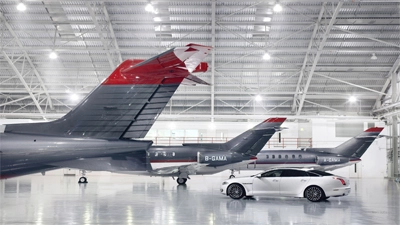
Crypto Propels Aviation: Invest in Skyward Growth Now
The world of aviation, once perceived as a realm of traditional finance and established players, is increasingly finding itself intertwined with the dynamic world of cryptocurrency. This nascent relationship is more than just a fleeting trend; it represents a potential paradigm shift in how aviation businesses operate, secure funding, and engage with their customers. For savvy crypto investors, this presents a unique opportunity to diversify their portfolios and potentially tap into the immense growth potential within the aviation sector. We're moving beyond the simple act of paying for a ticket with Bitcoin; we're talking about a fundamental reimagining of aviation infrastructure using blockchain technology and a reimagining of the capital investment landscape. Consider the sheer scope of operations within the aviation industry: manufacturing aircraft, managing complex supply chains, operating global airline networks, maintaining stringent safety standards, handling diverse workforces, and navigating a complex web of international regulations. These all present opportunities for blockchain solutions. One prominent area where crypto is making headway is in fractional ownership. Owning a private jet or even a small portion of a commercial aircraft has always been the preserve of the ultra-wealthy or massive companies. The cumbersome process of asset tracking, transfer of ownership, and verifying authenticity, combined with the enormous capital outlays has effectively excluded most of the population. Now, with the help of NFTs (Non-Fungible Tokens) representing shares of aircraft ownership, the possibility of pooling capital and democratizing access to these previously inaccessible assets is becoming increasingly real. These fractional ownership models can benefit both those investing in the aviation sector and the operators themselves; opening up new funding channels, and reducing the burden on traditional banking for securing large sums. Smart contracts embedded within the blockchain automate the complexities of managing ownership transfers, dividend payouts, and other aspects of shared asset management, offering unprecedented transparency and trust. This makes investment in aviation more accessible and potentially more liquid than ever before. Another critical area is supply chain management. The aviation industry depends on a long and intricate network of suppliers from raw material mining to manufacturing finished components. This creates challenges regarding tracking the journey of parts, ensuring authenticity, managing inventory, and maintaining quality control. Blockchain's ability to create an immutable ledger provides the transparency and traceability necessary to streamline these complex processes. Imagine a scenario where every component in an aircraft can be easily tracked through its journey, with each step in the supply chain recorded on the blockchain. This not only allows for greater transparency but also reduces the risk of counterfeit parts entering the system, improving safety and reducing potential fraud. This enhances reliability, trust and the efficiency of the entire supply chain. Another critical area with exciting applications is in streamlining payments and reducing transaction costs. Traditional aviation payments often involve multiple intermediaries, complex international banking systems, and lengthy settlement times which rack up unnecessary costs for businesses and the customers, often also resulting in high fees. Cryptocurrencies have the potential to drastically reduce these costs and transaction times, by acting as a more efficient, peer-to-peer system. This is particularly useful for international airlines, who conduct a large part of their business across borders and could benefit immensely from low-fee, high-speed digital payment infrastructure. For customers, this could translate to lower ticket prices and greater convenience for booking flights and additional services. Another exciting avenue for digital currencies is in the area of loyalty programs. Airlines and travel providers often have complex loyalty systems that are difficult for customers to navigate and lack true interoperability across brands. Using blockchain to tokenize loyalty points could create a more flexible and secure system which would make the rewards themselves transferrable, tradeable, and interoperable between platforms. Customers could then have greater control over their rewards and use them in more useful ways, while providing airlines with new ways to incentivize engagement and reward their loyal customer bases. Finally, the use of crypto assets allows for more accessible and streamlined fundraising for aviation startups. Traditional methods of raising capital, such as IPOs or venture capital rounds, can be lengthy, complex and challenging, particularly for new businesses. ICOs (Initial Coin Offerings) or STOs (Security Token Offerings) can provide a faster and more democratic mechanism for raising capital directly from investors. Crypto tokens also allow for a wider range of potential investors, both retail and institutional, and enable founders to raise the funds necessary for their disruptive and innovative ideas.
The integration of crypto into the aviation business, however, is not without its challenges. The volatility of crypto markets is a major concern, particularly when it comes to long-term planning and investment. The aviation industry is a very heavily regulated sector, and therefore presents a unique challenge for integrating new technologies. Governments worldwide have widely varying stances and regulations around blockchain and digital assets, and airlines will have to ensure they are complying with all relevant legal frameworks in order to operate and scale successfully. Many potential blockchain applications are still at an early stage of development and require further research and testing before widespread implementation. Furthermore, the level of awareness and understanding of blockchain technology varies significantly across the industry. There are a variety of challenges that need to be addressed before digital assets can be fully integrated into the aviation business, including user education, developing secure and scalable blockchain platforms, and establishing international standardization. The need to address these challenges, however, should not diminish the massive opportunities that lie ahead. As the crypto space continues to mature, and as aviation businesses become more open to adopting new technologies, the synergy between these two industries is likely to become more pronounced. This partnership will not only benefit businesses and customers but will also create new avenues for innovation and growth within the aviation sector. For those looking to diversify their portfolios beyond the usual crypto investments, carefully considering the developments in this space may very well prove to be highly lucrative and transformative. It’s also important to remember that, with all investments, thorough due diligence and a comprehensive understanding of the risks and opportunities are essential before making any decisions. By acknowledging the current challenges, while maintaining a vision for the huge potential benefits, crypto investors will have the opportunity to be part of a monumental shift in how the aviation business is operated, funded, and experienced in the future. This synergy is truly a chance to be part of the future of flight, not just as passengers but as informed, forward-thinking investors. The journey ahead will likely be a long and sometimes turbulent one, but those willing to embrace the potential of this fusion will be on the leading edge of progress. While the technology is very nascent and is still working to gain mass adoption across many sectors and industries, the convergence of cryptocurrency and aviation has the power to transform an already globally impacting sector. As investors, it’s more important than ever to understand the disruptive potential of these technologies and to evaluate the possible investment opportunities available in this rapidly evolving space. This convergence signifies not only a change in how we think about aviation but also a significant opportunity for investors seeking to diversify their portfolios and capitalize on the technological revolution currently underway. The sky isn’t the limit anymore; it’s just the beginning.



